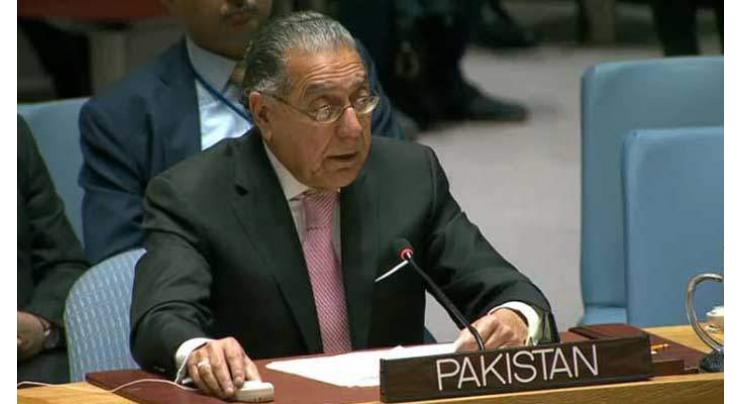
- Home
- Pakistan
- News
- Land degradation threatens well-being of humans, species; intensifies climate change: ECOSOC Chief
Land Degradation Threatens Well-being Of Humans, Species; Intensifies Climate Change: ECOSOC Chief
Umer Jamshaid Published June 15, 2021 | 12:53 AM

The President of United Nations (UN) Economic and Social Council (ECOSOC), Pakistani Ambassador Munir Akram, Monday said the degradation of one-fifth Earth's land area was undermining the well-being of 3.2 billion people worldwide, driving species to extinction and intensifying climate change, and urged boosting of remedial steps
UNITED NATIONS, (UrduPoint / Pakistan Point News - 14th Jun, 2021 ) :The President of United Nations (UN) Economic and Social Council (ECOSOC), Pakistani Ambassador Munir Akram, Monday said the degradation of one-fifth Earth's land area was undermining the well-being of 3.2 billion people worldwide, driving species to extinction and intensifying climate change, and urged boosting of remedial steps.
"The effects of unsustainable land management practices and demographic pressure on land degradation and desertification are also being exacerbated worldwide due to the effects of climate change," he said while speaking in the UN General Assembly's High-level Dialogue on Desertification and Land Degradation.
These include -- but are not limited to -- changing rainfall patterns, increased frequency and intensity of drought and floods, rising temperatures, and profound ecological shifts, the ECOSOC chief said, pointing out populations' abilities to generate livelihoods were becoming limited, particularly in the dry lands.
"This has also led to increased poverty, malnutrition, migration, political insecurity, and conflict," he said while underscoring the urgency of the situation being created by the phenomenon of desertification and land degradation.
These losses resulted from direct and indirect factors, including deforestation, unsustainable agricultural practices, land use change and urbanization, Ambassador Akram said.
Noting that commitments to land restoration are estimated at 1 billion hectares, out of which 450 million hectares are committed through land degradation neutrality targets, he said the progress achieved thus far in that regard was highly encouraging.
The momentum should be maintained though putting an end to the process of deforestation, the ECOSOC chief said.
"We must provide alternatives for rural populations dependent on wood burning through renewable energy projects and by creation of job opportunities in the rural areas." In this regard, he cited Pakistan's Eco-System Restoration Initiative to transition towards an environmentally resilient society by mainstreaming adaptation and mitigation through ecologically targeted initiatives encompassing afforestation, such as 10 billion trees tsunami, biodiversity conservation, and attaining land degradation neutrality.
"Such examples could be easily replicated in other parts of the world," Ambassador Akram added.
Also important, he said, was the full utilization of science and technology to halt land degradation and desertification, pointing to drone technology, which was growing at a rate of over 20% and is expected to double in the next 5-7 year.
"Drone farming has the potential to boost yields by enabling farmers to monitor crops frequently and intervene remotely." But, he said, the key to the implementation of all plans and programs was a resolution of the debt crisis, which hampered countries from making outlays on nature-based solutions and reforestation.
"Green bonds", the Pakistani envoy said, could be adopted to provide financing for sustainable agriculture and reforestation.
"It is also imperative to hold our advanced country partners to their commitment to mobilize the hundred billion Dollars in climate finance," the ECOSOC chief added.
Related Topics
Recent Stories

Robinson, bowlers help New Zealand go 2-1 up against Pakistan

Shahzeb Chachar to hold khuli kachehri on April 26

Heatwave amid Israel's aggression in Gaza brings new misery, disease risk

Tourism must change, mayor says as Venice launches entry fee

Court adjourns Judicial Complex attack case till May 17

Nasreen Noori’s book ‘Popatan Jahra Khwab’ launched

Wafaqi Mohtasib inspection team visits Excise and taxation office

AJLAC announces 5th Conference titled ‘People’s Mandate: Safeguarding Civil ..

Pak-US officials engage to enhance trade, investment ties

IBCC to promote educational excellence, expand regional presence

Pakistani 'Blue Helmets' serving UN Peacekeeping Mission in DR Congo set to leav ..

Putin says plans to visit China in May
More Stories From Pakistan
-
Naval Chief participates in 19th Western Pacific Naval Symposium in China
2 hours ago -
Int'l symposium addresses capacity building for safe, environmentally sound ship recycling in Pakist ..
2 hours ago -

Shahzeb Chachar to hold khuli kachehri on April 26
3 hours ago -

Court adjourns Judicial Complex attack case till May 17
3 hours ago -

Nasreen Noori’s book ‘Popatan Jahra Khwab’ launched
3 hours ago -

Wafaqi Mohtasib inspection team visits Excise and taxation office
3 hours ago
-

AJLAC announces 5th Conference titled ‘People’s Mandate: Safeguarding Civil Rights in South Asia ..
3 hours ago -

IBCC to promote educational excellence, expand regional presence
3 hours ago -

Pakistan embassy organizes scholarship award ceremony in Kathmandu
3 hours ago -

SC to hear case pertaining IHC judges' letter on April 30
3 hours ago -

SC orders removal of barriers outside buildings in Karachi
3 hours ago -

PFA launches crackdown, impose fine for selling expired drinks, food items
3 hours ago









